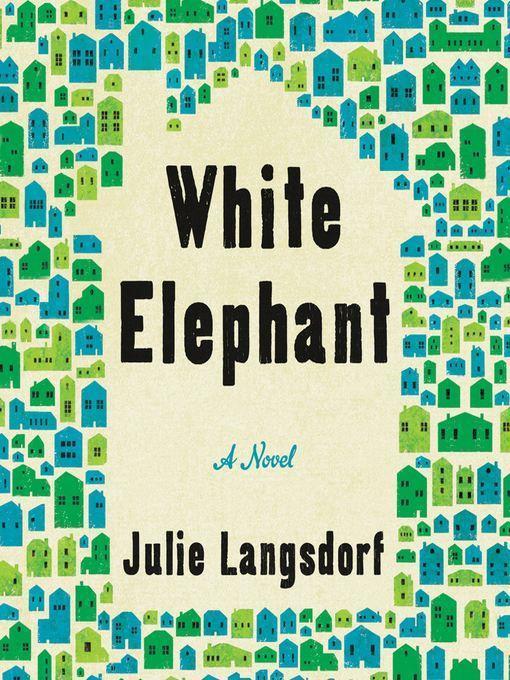
White Elephant
A Novel
کتاب های مرتبط
- اطلاعات
- نقد و بررسی
- دیدگاه کاربران
نقد و بررسی

March 1, 2019
DEBUT Willard Park is a charming suburb of Washington, DC, with a small-town flavor and a simmering stew of growing resentments. Tree-lined streets and 100-year-old Sears catalog homes are under attack by Nick Cox, a transplanted Southern builder and developer with a thirst for tasteless, ostentatious McMansions. Ted and Allison Miller are sandwiched between the oversized abode of Cox and his hapless wife, Kaye, on one side, and the White Elephant, so dubbed by the locals, a monstrosity Nick is building-to-sell on the other side. Ted is obsessed with the trees being lost in all the construction and the mysterious destruction of other beloved trees throughout the town. Allison, a photographer working on a book of her town, despairs of Ted's dormant libido. Add to the growing tensions that spill over into the community is the disturbing friendship between the two couples' teen daughters. Debut novelist Langsdorf's sure hand lays bare the secrets and hypocrisies of 21st-century American communities hell-bent on preserving what may never have been as they stumble awkwardly toward the light of what could be with just a touch of perspective. VERDICT Funny, spot-on satire relevant in today's divisive noise-machine of battling egos.--Beth Andersen, formerly with Ann Arbor Dist. Lib., MI
Copyright 2019 Library Journal, LLC Used with permission.

December 15, 2018
Residents of a self-consciously quaint Washington, D.C., suburb end up at war when a wealthy family moves in."One couldn't, in all honesty, accuse Nick Cox of starting the 'big house' craze in Willard Park. The tearing down and building up had started long before he moved in....Now houses wrapped in shimmering Tyvek slips were a common sight. Latino gardeners spilled out of trucks in the springtime along with wheelbarrows full of mulch and trees with round, burlap bottoms." Langsdorf's debut social satire gets off to a promising start, laying out the tensions in a town on the cusp of change through the conflicts simmering on one block of Tunlaw Place. At its center are Ted and Allison, a nice couple who've lived in Willard Park for almost 14 years. Their problems were no worse than the usual dull marriage/adolescent daughter scenario until the philistines arrived, building a castle on one side of them and a mammoth spec house--the titular "white elephant"--on the other. As the town divides bitterly over a proposed building moratorium, a mysterious tree murderer hits the streets with a chainsaw, ravaging the arboreal population. Langsdorf's not-too-endearing cast includes several villains (two bullies and one pot smoker), a couple of saints (tree-hugger Ted and his intellectually disabled twin), and two central female characters who should be easier to keep straight than they are. An almost Shirley Jackson-esque view of human nature emerges when the bulletin board at the local cafe spontaneously blooms with tattletale notes: "Melanie Frank said her black walnut trees are 'not worth the trouble'." "Ana Lopez cheats on her taxes." "Antoine Beignet has a second family in Toledo." After a surprisingly cruel climax, a cleanup chapter can't quite make the skies blue again. A dark comedy with more darkness than comedy.
COPYRIGHT(2018) Kirkus Reviews, ALL RIGHTS RESERVED.

November 15, 2018
All is not well in Willard Park. The seemingly idyllic suburb outside Washington, D.C., quickly becomes a battleground as developer Nick pushes forward his ostentatious construction projects, raising the ire of his neighbor Ted. The last straw for Ted is Nick's destruction of the precious red maple tree Ted had planted for his daughter. As Ted begins a campaign for a temporary moratorium on building houses in the town, more trees are mysteriously felled. Meanwhile, Ted's wife is harboring an illicit attraction to his nemesis, their teenage daughter is being drawn into a noxious search for popularity, and a newcomer to the town ends up having to handle much more than she bargained for. Langsdorf gleefully skewers small-town stereotypes, such as the sharp and ambitious real-estate agent, the suburban dad hiding a pot habit, and the sorority sister who can't figure out how she ended up unhappy. But beneath the caricatures are deeper truths about belonging, community, and relationships. In this smartly satirical novel, the raging feud reveals much about the residents' core values.(Reprinted with permission of Booklist, copyright 2018, American Library Association.)

























دیدگاه کاربران